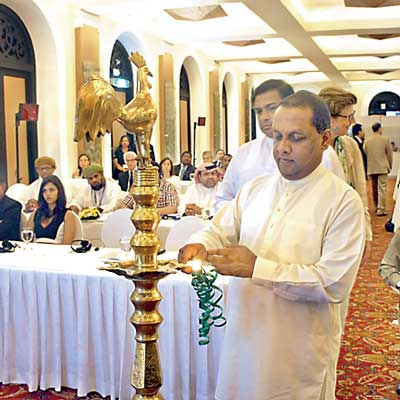Wednesday Feb 18, 2026
Wednesday Feb 18, 2026
Friday, 5 June 2015 00:00 - - {{hitsCtrl.values.hits}}
Illegal, Unreported and Unregulated (IUU) fishing continues to be a threat to the effective conservation and management of fish stocks in the North West Indian Ocean and is causing economic and social losses for the coastal countries in this region that negatively impact their food security and livelihoods.
In order to address this, a number of workshops are being organised around the world by the Food and Agriculture Organization of the United Nations (FAO) within of the framework of a broader international program to strengthen capacity for the effective implementation of the 2009 FAO Agreement on Port State Measures to prevent, deter and eliminate IUU fishing – this FAO program of work is funded by the Government of Norway.
A workshop is being held from 1 to 5 June in Colombo, addressing the coastal countries of the North West Indian Ocean, including adjacent seas and gulfs, hosted by the Government of Sri Lanka. The workshop was attended by more than 40 officials from 15 countries from Africa, Asia and the Middle East as well as experts from the European Union, CITES, PEW Charitable Trust and WWF. In addition to the technical support from FAO, the workshop also benefitted from the technical contribution of the North East Atlantic Fisheries Commission.
The FAO Agreement on Port State Measures has been designed to intensify global collaboration between fisheries and port authorities, coast guards and navies. The aim is to eliminate IUU fishing, through globally agreed minimum standards for concerted action, enabling better inspections and controls at the ports and on vessels and strengthened flag state responsibility.
Beth Crawford, FAO Representative in Sri Lanka, at the opening of the Workshop, emphasised the need for such a meeting to raise awareness and strengthen capacity of the participating countries. The workshop is expected to be a first step towards identifying common pathways and actions in combatting IUU fishing between the countries in the North West Indian Ocean.
In her address, Royal Norwegian Embassy Ambassador Extraordinary and Plenipotentiary Grete Lochen stated: “The failure of States to effectively control the fishing operations of vessels flying their flags is the core of the problem of IUU fishing.”
She added: “Norway has been a key player in developing international standards for fisheries control in ports and fighting this phenomenon [of IUU fishing] is of the highest priority to Norway.”
Minister of Fisheries and Aquatic Resources Development Mahinda Amaraweera attended the opening of the workshop. He stressed the commitment of the Government of Sri Lanka in taking steps towards protecting marine resources and preventing or deterring actions that can undermine the effectiveness of management and conservation measures.
He said: “Sri Lanka has taken several important measures, to strengthen our Fisheries Monitoring, Control, and Surveillance process. We need to ensure that our officials are familiar with these [international fisheries] instruments, and Sri Lanka welcomes the opportunity provided to our stakeholders, to participate in this workshop.”
Matthew Camilleri, FAO Fisheries Liaison Officer and Technical Secretary of the workshop, informed that “the principal objective of the workshop was to improve the understanding of the provisions of the PSMA, to highlight the policy, legal, institutional and operational requirements for the effective implementation of its provisions, and to enhance the necessary skills of national officers in the implementation of Port State Measures.”
Blaise Kuemlangan, FAO Chief Development Law Branch, underlined that two countries in the region – Oman and Sri Lanka – have already ratified the Agreement and are developing policies and legislation towards its implementation. It is expected that many more countries will follow this path in the near future.
Piero Mannini, FAO Senior Fisheries Liaison Officer and Secretary of the Regional Commission for Fisheries, (RECOFI), emphasised the importance of fishery resources as a regional wealth, stating: “RECOFI Members share the benefit of exploiting many of the fishery stocks as well as the responsibility for their sound management, which will be achieved through effective regional cooperation including through Port State Measures.”
The workshop will come to a close today, 5 June, and it is expected that a set of recommendations and strategies will be drawn up to instil the effective implementation of Port State Measures in the countries and sub-regions concerned. It is hoped that through this workshop, cooperation among the countries will be further strengthened in order to combat IUU fishing in a concerted manner.